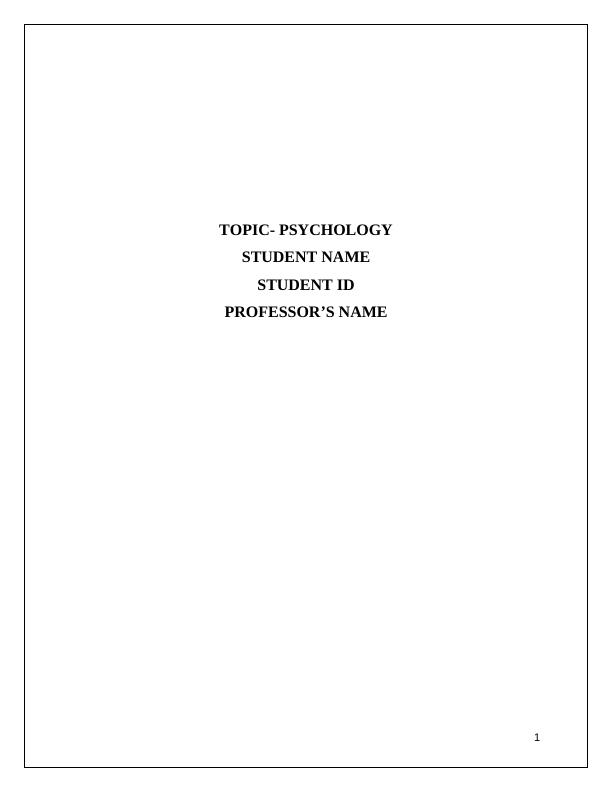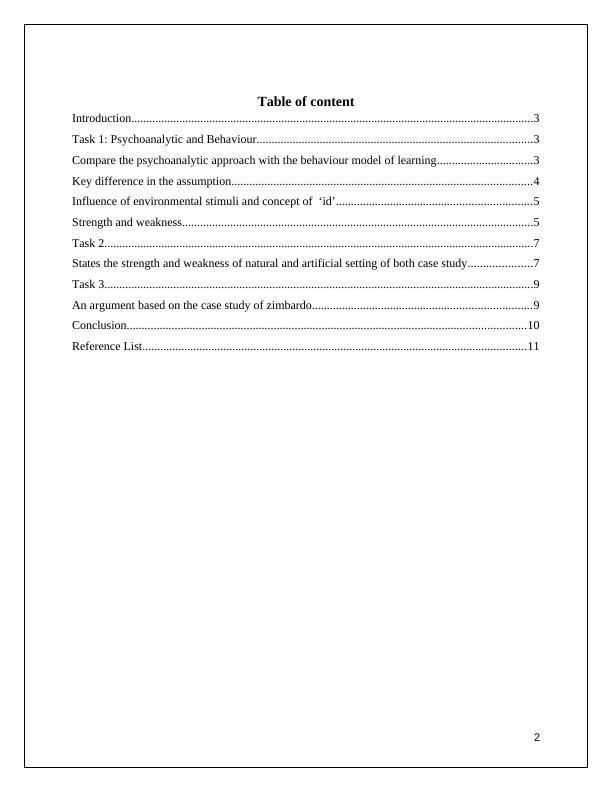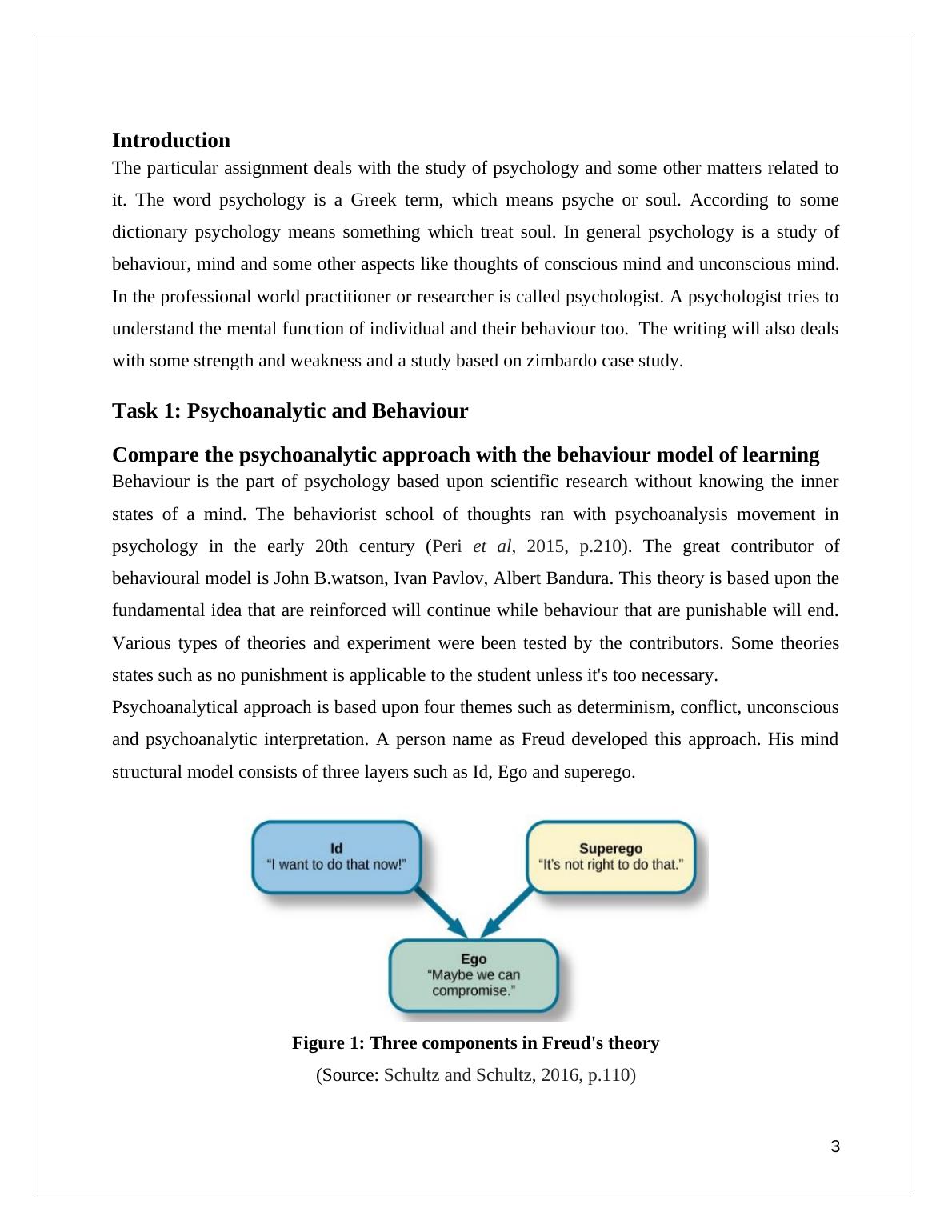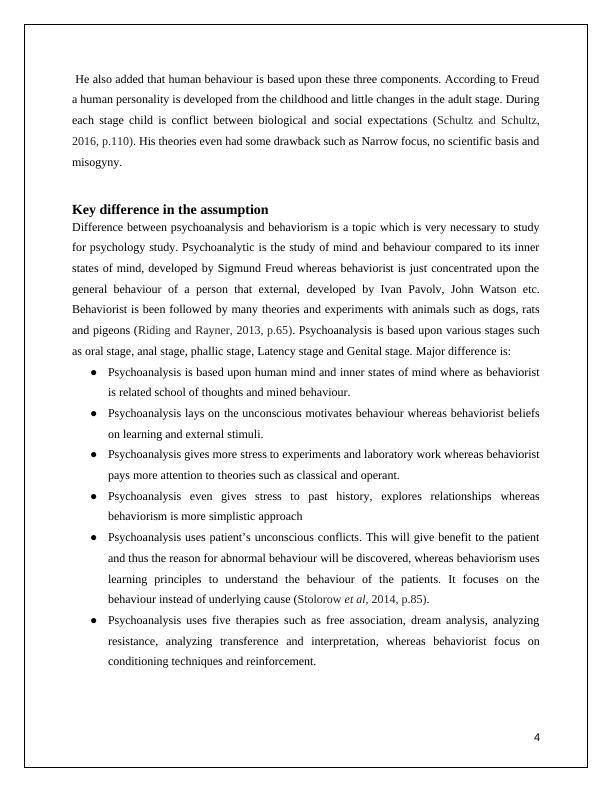Comparison of Psychoanalytic and Behavioural Approaches in Psychology
Added on 2023-04-05
11 Pages2301 Words168 Views
TOPIC- PSYCHOLOGY
STUDENT NAME
STUDENT ID
PROFESSOR’S NAME
1
STUDENT NAME
STUDENT ID
PROFESSOR’S NAME
1

Table of content
Introduction......................................................................................................................................3
Task 1: Psychoanalytic and Behaviour............................................................................................3
Compare the psychoanalytic approach with the behaviour model of learning................................3
Key difference in the assumption....................................................................................................4
Influence of environmental stimuli and concept of ‘id’.................................................................5
Strength and weakness.....................................................................................................................5
Task 2...............................................................................................................................................7
States the strength and weakness of natural and artificial setting of both case study.....................7
Task 3...............................................................................................................................................9
An argument based on the case study of zimbardo.........................................................................9
Conclusion.....................................................................................................................................10
Reference List................................................................................................................................11
2
Introduction......................................................................................................................................3
Task 1: Psychoanalytic and Behaviour............................................................................................3
Compare the psychoanalytic approach with the behaviour model of learning................................3
Key difference in the assumption....................................................................................................4
Influence of environmental stimuli and concept of ‘id’.................................................................5
Strength and weakness.....................................................................................................................5
Task 2...............................................................................................................................................7
States the strength and weakness of natural and artificial setting of both case study.....................7
Task 3...............................................................................................................................................9
An argument based on the case study of zimbardo.........................................................................9
Conclusion.....................................................................................................................................10
Reference List................................................................................................................................11
2

Introduction
The particular assignment deals with the study of psychology and some other matters related to
it. The word psychology is a Greek term, which means psyche or soul. According to some
dictionary psychology means something which treat soul. In general psychology is a study of
behaviour, mind and some other aspects like thoughts of conscious mind and unconscious mind.
In the professional world practitioner or researcher is called psychologist. A psychologist tries to
understand the mental function of individual and their behaviour too. The writing will also deals
with some strength and weakness and a study based on zimbardo case study.
Task 1: Psychoanalytic and Behaviour
Compare the psychoanalytic approach with the behaviour model of learning
Behaviour is the part of psychology based upon scientific research without knowing the inner
states of a mind. The behaviorist school of thoughts ran with psychoanalysis movement in
psychology in the early 20th century (Peri et al, 2015, p.210). The great contributor of
behavioural model is John B.watson, Ivan Pavlov, Albert Bandura. This theory is based upon the
fundamental idea that are reinforced will continue while behaviour that are punishable will end.
Various types of theories and experiment were been tested by the contributors. Some theories
states such as no punishment is applicable to the student unless it's too necessary.
Psychoanalytical approach is based upon four themes such as determinism, conflict, unconscious
and psychoanalytic interpretation. A person name as Freud developed this approach. His mind
structural model consists of three layers such as Id, Ego and superego.
Figure 1: Three components in Freud's theory
(Source: Schultz and Schultz, 2016, p.110)
3
The particular assignment deals with the study of psychology and some other matters related to
it. The word psychology is a Greek term, which means psyche or soul. According to some
dictionary psychology means something which treat soul. In general psychology is a study of
behaviour, mind and some other aspects like thoughts of conscious mind and unconscious mind.
In the professional world practitioner or researcher is called psychologist. A psychologist tries to
understand the mental function of individual and their behaviour too. The writing will also deals
with some strength and weakness and a study based on zimbardo case study.
Task 1: Psychoanalytic and Behaviour
Compare the psychoanalytic approach with the behaviour model of learning
Behaviour is the part of psychology based upon scientific research without knowing the inner
states of a mind. The behaviorist school of thoughts ran with psychoanalysis movement in
psychology in the early 20th century (Peri et al, 2015, p.210). The great contributor of
behavioural model is John B.watson, Ivan Pavlov, Albert Bandura. This theory is based upon the
fundamental idea that are reinforced will continue while behaviour that are punishable will end.
Various types of theories and experiment were been tested by the contributors. Some theories
states such as no punishment is applicable to the student unless it's too necessary.
Psychoanalytical approach is based upon four themes such as determinism, conflict, unconscious
and psychoanalytic interpretation. A person name as Freud developed this approach. His mind
structural model consists of three layers such as Id, Ego and superego.
Figure 1: Three components in Freud's theory
(Source: Schultz and Schultz, 2016, p.110)
3

He also added that human behaviour is based upon these three components. According to Freud
a human personality is developed from the childhood and little changes in the adult stage. During
each stage child is conflict between biological and social expectations (Schultz and Schultz,
2016, p.110). His theories even had some drawback such as Narrow focus, no scientific basis and
misogyny.
Key difference in the assumption
Difference between psychoanalysis and behaviorism is a topic which is very necessary to study
for psychology study. Psychoanalytic is the study of mind and behaviour compared to its inner
states of mind, developed by Sigmund Freud whereas behaviorist is just concentrated upon the
general behaviour of a person that external, developed by Ivan Pavolv, John Watson etc.
Behaviorist is been followed by many theories and experiments with animals such as dogs, rats
and pigeons (Riding and Rayner, 2013, p.65). Psychoanalysis is based upon various stages such
as oral stage, anal stage, phallic stage, Latency stage and Genital stage. Major difference is:
● Psychoanalysis is based upon human mind and inner states of mind where as behaviorist
is related school of thoughts and mined behaviour.
● Psychoanalysis lays on the unconscious motivates behaviour whereas behaviorist beliefs
on learning and external stimuli.
● Psychoanalysis gives more stress to experiments and laboratory work whereas behaviorist
pays more attention to theories such as classical and operant.
● Psychoanalysis even gives stress to past history, explores relationships whereas
behaviorism is more simplistic approach
● Psychoanalysis uses patient’s unconscious conflicts. This will give benefit to the patient
and thus the reason for abnormal behaviour will be discovered, whereas behaviorism uses
learning principles to understand the behaviour of the patients. It focuses on the
behaviour instead of underlying cause (Stolorow et al, 2014, p.85).
● Psychoanalysis uses five therapies such as free association, dream analysis, analyzing
resistance, analyzing transference and interpretation, whereas behaviorist focus on
conditioning techniques and reinforcement.
4
a human personality is developed from the childhood and little changes in the adult stage. During
each stage child is conflict between biological and social expectations (Schultz and Schultz,
2016, p.110). His theories even had some drawback such as Narrow focus, no scientific basis and
misogyny.
Key difference in the assumption
Difference between psychoanalysis and behaviorism is a topic which is very necessary to study
for psychology study. Psychoanalytic is the study of mind and behaviour compared to its inner
states of mind, developed by Sigmund Freud whereas behaviorist is just concentrated upon the
general behaviour of a person that external, developed by Ivan Pavolv, John Watson etc.
Behaviorist is been followed by many theories and experiments with animals such as dogs, rats
and pigeons (Riding and Rayner, 2013, p.65). Psychoanalysis is based upon various stages such
as oral stage, anal stage, phallic stage, Latency stage and Genital stage. Major difference is:
● Psychoanalysis is based upon human mind and inner states of mind where as behaviorist
is related school of thoughts and mined behaviour.
● Psychoanalysis lays on the unconscious motivates behaviour whereas behaviorist beliefs
on learning and external stimuli.
● Psychoanalysis gives more stress to experiments and laboratory work whereas behaviorist
pays more attention to theories such as classical and operant.
● Psychoanalysis even gives stress to past history, explores relationships whereas
behaviorism is more simplistic approach
● Psychoanalysis uses patient’s unconscious conflicts. This will give benefit to the patient
and thus the reason for abnormal behaviour will be discovered, whereas behaviorism uses
learning principles to understand the behaviour of the patients. It focuses on the
behaviour instead of underlying cause (Stolorow et al, 2014, p.85).
● Psychoanalysis uses five therapies such as free association, dream analysis, analyzing
resistance, analyzing transference and interpretation, whereas behaviorist focus on
conditioning techniques and reinforcement.
4

End of preview
Want to access all the pages? Upload your documents or become a member.
Related Documents
Assignments | Introduction to Psychologylg...
|8
|2514
|332
Psychology: Approaches, Research Methods, and Ethical Issueslg...
|9
|2966
|142
Personality Theory: A Comparison of Freud and Carl Roger's Theorieslg...
|4
|746
|328
Introduction to Psychology: Psychoanalytic Approach and Behavioural Approachlg...
|5
|1384
|267
Psychology: Approaches, Research Methods, and Ethical Issueslg...
|10
|3216
|294
Personality Theories: Freudian and Eysenck's Theories of Personalitylg...
|17
|3508
|168
